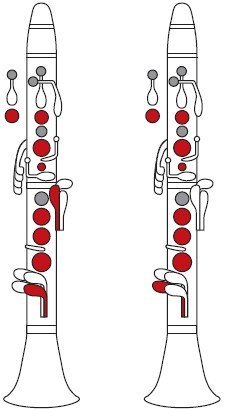The D# Lydian scale holds a unique place in the clarinet repertoire, exuding a character that's both vibrant and bright. This scale, which consists of the notes D#, E#, F##, G#, A#, B#, and C##, has historically influenced many compositions that take advantage of its distinctive sound. Its relationship to other scales and its unique intervals create a sound that stands out in various musical genres. Experiencing the D# Lydian scale can truly enrich your understanding of how clarinet music has evolved over the decades, and enhance your playing repertoire.

Clarinet Fingering Charts are always FREE at MartinFreres.net!
Historical Roots of the D# Lydian Scale
The D# Lydian scale's history is rich and fascinating. Known for its raised fourth scale degree, this scale brings out an uplifting and bright quality in music. Composers have long been drawn to the D# Lydian for its ability to infuse their works with a sense of wonder and exploration. What makes this scale so appealing to musicians and composers? It offers a fresh alternative to the more common major and minor scales, opening doors to creative harmonizations and melodic lines.
Notable Compositions Featuring D# Lydian
Let's explore some key pieces where the D# Lydian scale truly shines. Many renowned clarinetists and composers have experimented with this scale. For example, Igor Stravinsky, the innovative 20th-century composer, often explored unconventional scales in his works. His use of rich harmonies combined with dynamic rhythms paved the way for the Lydian scale to become prominent in modern compositions.
| Composer | Notable Work | Year |
|---|---|---|
| Igor Stravinsky | Petrushka | 1911 |
| Bela Bartok | Mikrokosmos | 1926-1939 |
| George Russell | Lydian Chromatic Concept of Tonal Organization | 1953 |
The Jazz Influence
The impact of jazz on the D# Lydian scale's popularity cannot be overstated. This scale has become a cornerstone in jazz improvisation. Jazz clarinetists like Benny Goodman and Artie Shaw embraced the D# Lydian for its ability to evoke a playful spontaneity. Their solos, built around this scale, pushed musical boundaries and captivated audiences, showcasing the clarinet's versatility in new and exciting ways.
Contemporary Use of D# Lydian
The D# Lydian scale continues to be relevant in modern music. As musicians explore new styles, this scale serves as a valuable tool for sound exploration. It's a favorite among today's innovative musicians, allowing them to bridge traditional clarinet elements with contemporary rhythms. This versatility has kept the D# Lydian scale at the forefront of musical innovation.
Practical Benefits for Clarinetists
Understanding the D# Lydian scale offers practical advantages for clarinetists. When studying various pieces, musicians can experiment with different fingerings and enharmonic notes that align with this scale. Regular practice of these modes can improve finger dexterity and expand your understanding of the clarinet's capabilities. Mastering this scale can bring new life to performances, allowing players to express a wide range of emotions through their music.
Creative Possibilities with D# Lydian
As you progress in your musical journey, consider challenging yourself with compositions that use the D# Lydian scale. You might arrange existing pieces or even compose your own using this scale as a foundation. The creative possibilities are endless, and each piece you create will reflect your unique musical voice and interpretation.
Personal Expression through D# Lydian
The D# Lydian scale offers a unique avenue for personal expression in music. Each note in this scale provides an opportunity for musicians to create an emotional connection with their audience. When practicing your scales, remember that every note in the D# Lydian can tell a story, opening up a world of musical narratives waiting to be explored.
Conclusion
The D# Lydian scale holds significant importance in the history of clarinet music. It offers insights into the instrument's past while serving as a powerful tool for present and future creativity. So, pick up your clarinet and explore the world of the D# Lydian scale! Its distinctive sound will help you find new ways to connect with your audience and elevate your musical artistry.
Table of Contents
- Historical Roots of the D# Lydian Scale
- Notable Compositions Featuring D# Lydian
- The Jazz Influence
- Contemporary Use of D# Lydian
- Practical Benefits for Clarinetists
- Creative Possibilities with D# Lydian
- Personal Expression through D# Lydian
- Conclusion








